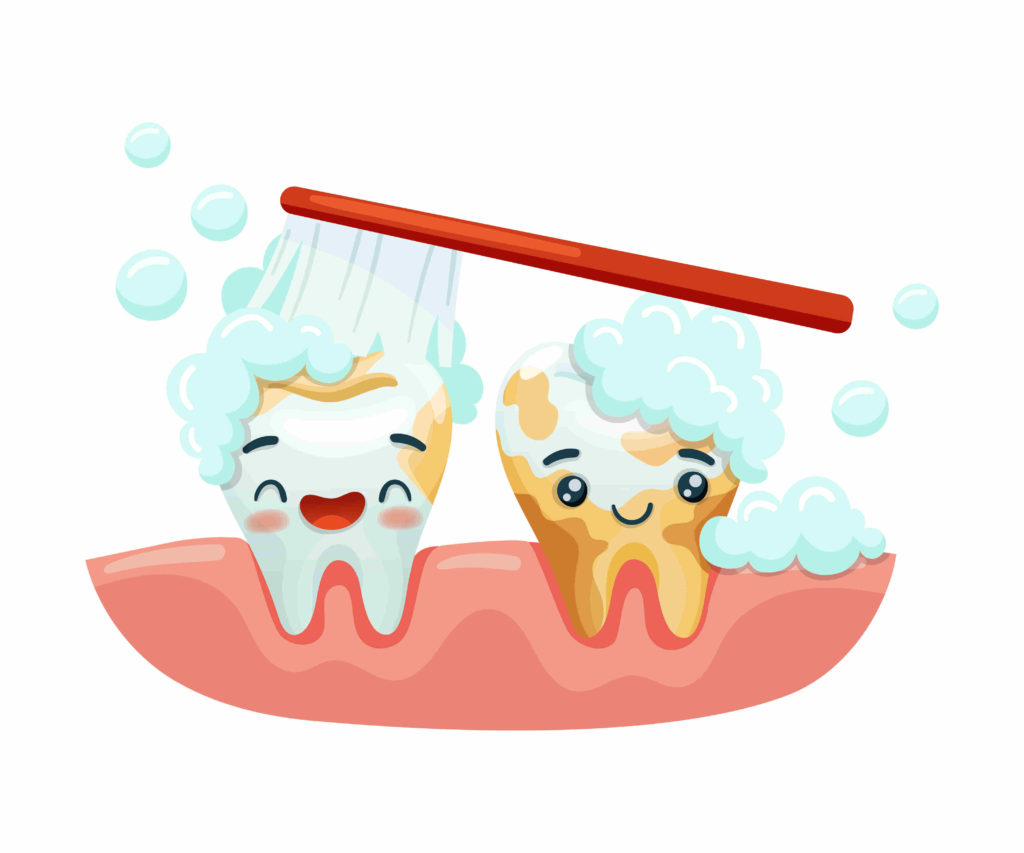When you inspect your mouth, you may notice a few dental stains that don't disappear after brushing. These marks occur mainly in adults, but can also affect children. The stains may appear on the front or back of your teeth, inside or outside. The brown color can vary from light yellow to brown, depending on the individual. How can you treat these imperfections to achieve a beautiful smile? Discover HELVIDENT's advice on how to remove these stains and prevent their appearance.
What can be done about dental stains?
There are several solutions for treating brown spots on teeth.
Consult the dentist
To treat brown spots on teeth, some people use natural remedies such as baking soda, coconut oil or banana peel. But it's best to consult a dentist in Switzerland if you want to avoid cavities and get medical treatment for brown spots on teeth. This will be an opportunity to check that you have no tooth decay and treat any problems that may arise.
Change your consumption habits
Most brown spots on enamel are superficial and disappear on their own. Dental professionals advise people to limit consumption of food products containing tannins, and to avoid drinking coffee, tea, red wine and dark-colored soft drinks. If you smoke, it's important to stop, as tobacco smoke is the main cause of brown spots on teeth. You should also brush your teeth at least twice a day, using fluoride toothpaste and dental floss or brushes to clean the interdental spaces. Finally, remember to rinse your mouth after eating sweet or acidic foods.
Tooth whitening
Teeth whitening can be a good solution in some cases, but be careful with the home bleaching treatments. They can be dangerous, and there may be other reasons why your teeth become stained. You may want to consult a dentist to find out what's causing the stains. This professional can suggest :
- In-office treatment: a product rich in hydrogen peroxide is applied to the teeth for about an hour.
- An outpatient treatment using a custom-made mouthpiece: a lightening product is placed inside, and you wear it for several hours every day. This treatment lasts between 8 and 15 days, depending on your needs.
- A mixed treatment that combines the two previous treatments.
What causes teeth stains?
If you notice brown spots on your teeth, don't panic. It may be unsightly, but in most cases it's not serious.
Dental stains in babies
Staining of baby teeth is often linked to a build-up of plaque on the surface of the teeth. This means that teeth are not being brushed effectively and regularly. You should also be aware that your baby or child may have black stains on their teeth. This is a side effect of taking iron supplements. This phenomenon can also occur after a shock or a fall.
External causes of tooth discoloration
The causes are most often external. Because enamel is slightly porous, certain substances can stain it over time. Dentists in Lausanne and Fribourg speak of extrinsic staining.
Tooth colouring is essentially a matter of individual habits:
- Visit tobacco consumptionSmoking is one of the main causes of brown stains on teeth. It consists of tar and nicotine, which attack enamel.
- Poor oral hygiene.
- High, regular consumption of colored beverages (coffee, tea, red wine or soft drinks).
- Black tartar build-up between the teeth or on the gums.
- Chlorhexidine in mouthwash.
- The presence of cavities inside the teeth.
Intrinsic tooth discoloration
In other cases, the cause of brown discoloration is intrinsic. In other words, it comes from inside the tooth. Generally speaking, the cause is to be found in pathology, heredity or medication (cyclin, fluoride). A link has been established between brown spots and amoxicillin. This antibiotic, used to combat a number of infections, can in rare cases lead to tooth discoloration.
The HELVIDENT team welcomes you to our dental practices in Fribourg, Lausanne or Aigle. We perform all standard and specialized dental and orthodontic procedures, as well as implants. Don't hesitate to schedule a consultation with one of our dental hygienists for personalized advice on your oral hygiene.

